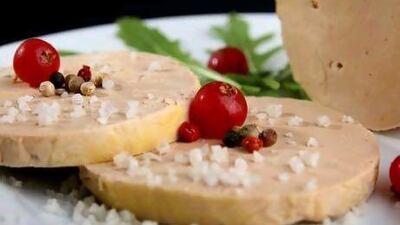With the delicacy foie gras facing bans around the world, we explore what it is that arouses such passion in those for and against it.
The fuss made about foie gras must seem mystifying to non-foodies. The liver of super-fattened French geese and ducks (its name means "fat liver"), few foods arouse so many passions for and against. For some, the richness and flavour of foie gras are the ultimate in culinary indulgence. For others, the forced feeding that the delicacy requires is a marker of how cruel humans can be to animals - so much so that foie gras is now facing bans worldwide.
After a brief ban in Chicago that ended four years ago, the US State of California banned both its production and sale on July 1. Now Compass, the UK's largest catering company, has also banned foie gras from its menus. With foie gras production methods already against the law in Argentina and Israel, these fresh moves could be the beginning of a wave which sees bans spreading across the world.
This is a possibility that the French are fighting with some intensity. Promising to bombard American politicians with free gifts of foie gras, France's government has interpreted the bans as an attack both on their culture and their exports.
Could this anti-foie gras wave someday lap at the shores of the Emirates? It certainly has many local fans to defend its sale. So synonymous is the extra-fattened liver with French haute cuisine that tables at some of the UAE's more Francophile restaurants are positively heaving with it. Scan the menu at establishments such as the Shangri-La Abu Dhabi hotel's Bord Eau or Dubai's Table 9, and you'll find dishes studded with this intensely rich delicacy. In February, Gourmet Abu Dhabi even structured an entire dinner to showcase its qualities.
Such elite popularity should prove hard to overcome. There's no denying, however, that the methods by which foie gras is produced are, to say the least, not at all pretty. During their final fortnight, caged ducks and geese destined for foie gras production are force-fed grain in vast quantities to enlarge their livers. This force feeding takes place by inserting a tube and funnel into the bird's oesophagus (often nowadays through a cut slit) and pumping in large amounts of moistened grain in just a few seconds. After two weeks of this treatment two to four times daily, the bird's liver will have swollen to many times its normal size, with the fat contained inside the liver rather than encasing it.
Animal rights activists believe this process involves cruelty, potentially giving the birds breathing problems and scarring their throats. Defenders of the process, on the other hand, insist that the birds' throat linings are naturally hardened and that the fattening process happens without struggle from the fowls themselves. But while any use of animals for meat involves some degree of cruelty, the process of making foie gras is gruesome-sounding enough that it puts even some happy carnivores off trying it at all.
So what are they missing? For those who love it, foie gras is like the meaty equivalent of a super-rich chocolate truffle. With a dense, unctuous texture like butter, it has a wonderfully savoury flavour that is nonetheless far more delicate than the usually strong taste of liver, a bit like intensely meaty broth whipped into cream. Far too rich to eat in large quantities, it works best spread thinly on toast, or perhaps to moisten and enrich other meats, such as in the classic old-school dish of tournedos Rossini.
Foie gras isn't just delicious, it's also been around for millennia - in many languages, the word for "liver" itself refers to the food. Italian fegato (and also French foie) derives from the Latin phrase iecur ficatum or "figged liver", a term that refers to the ancient practice of gorging geese on figs to enlarge their liver. Tradition alone is of course no justification for cruelty, and with pressure to ban foie gras growing stronger in the Anglo-Saxon world, this might just be one tradition that may start to fade away. Though not, of course, if the French have anything to do with it.
Food fight
The foie gras ban isn't the only Franco-American food fight. When France opposed America's 2003 US invasion of Iraq, some Americans renamed French fries "freedom fries", though the senator who proposed the name change later said he too regretted the invasion. The trend of politicising food is in fact something of an American habit. In 2006, the US saw the launch of "Minuteman Salsa", a supposedly 100 per cent American salsa that gave part of its profits to a group trying to deter illegal immigrants from Mexico, salsa's true home. Likewise, the defunct Star Spangled Ice Cream company once launched itself as a conservative alternative to the liberal Ben & Jerry's, offering flavours such as "I Hate the French Vanilla".

